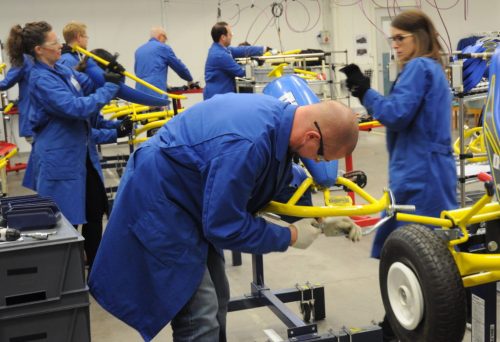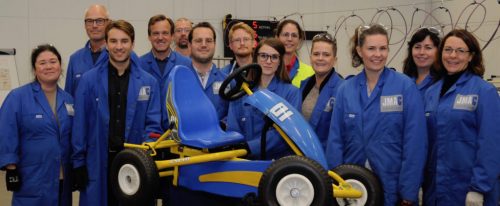– Few participants have a background from the automotive. Still, everyone finds relevant learning in two days here. What we highlight and train is the best practice in all forms of process-based production. It is just as relevant for the service sector as for industrial production, says Mikako Lago-Lengquist.
A training in the Pedal Cart factory can also be combined with a “Gemba Walk” at the host company Vibracoustic. The company is the main supplier of vibration dampers to a large number of the most well-known car brands in the world, and is a Lean company in the top tier.
Early morning at Vibracoustic’s factory in Forsheda, deep in the forests of Småland. It buzzes expectantly in the slightly cool production room. The student group from Luleå University of Technology representing managers from the construction industry will immediately be available as a production team in C2U’s own car factory, which is located here.
It is a Pedal Cart factory. The first full-scale Lean simulator of its kind when it saw the light of day fifteen years ago. The fact that it is a car factory is not important in this context, although C2U has brought a lot of Lean expertise from the automotive.
Authentic production
The unique thing about the simulation is the realistic environment, everything from the co-location with Vibracoustic, to the authentic factory premises, to the course participants being able to work with Lean production in full scale under the expert guidance of C2U’s Mikako Lago-Lengquist. Mikako was involved in designing the training at the start-up in 2006. It was developed in collaboration with the state-owned Vinnova, and the first version was established in Trollhättan. At the time, it was something completely new and unique, both in Sweden and the Nordic countries in general. Since then, both industrial companies and course providers have created their own variants, “inspired by” C2U:s original.
Like most Lean trainings, the Pedal Cart Factory is based on a rather hopelessly designed production. The first production round goes rather poorly, and the course participants learn why. Mikako points to weaknesses such as poor order, lack of overview, lack of job descriptions, poor communication on the topic and poor planning.
Improvement step by step
Step by step, Lean methodology with 5S, visual management, definition of work operations and standardization is reviewed and introduced. Directly from theory to practice. The participants are given specific challenges such as: How can you contribute to the team working according to plan ?, How do we ensure that production runs stably? What activities should you prioritize at your station so that the operations there can be carried out without unnecessary time? What are the value-adding activities? Etc. Participants’ zeal and temperature in the room rises considerably. Many people throw away their jackets.
The simulation is progressing, an appropriate production line has been established, a digital Andon system has been introduced and the production time is shrinking towards the 70 seconds per car that the participants have jointly set as a goal. Step by step, the process becomes more stable. Mikako is now introducing operator-controlled training through job rotation. The tasks each participant has learned are left to others, and it is the participant’s task to quickly and methodically put his/her colleague into the tasks. So, despite the fact that the work team has been rotated, the digital board says with clear text: The goal has been reached. Last car rolls out of the belt well within 70 seconds.
From the construction industry
 When we visit the factory, a group of students from the Swedish construction industry receive training. The participants are from NCC, Ikano Bostad, Veidekke and Bo Klok, and the training at the Pedal Cart factory is module 2 of a total of five modules in their study program. C2U’s client is VALLA Coach, which is a project within Smart Built Environments’ commitment to strengthening the Swedish construction industry.
When we visit the factory, a group of students from the Swedish construction industry receive training. The participants are from NCC, Ikano Bostad, Veidekke and Bo Klok, and the training at the Pedal Cart factory is module 2 of a total of five modules in their study program. C2U’s client is VALLA Coach, which is a project within Smart Built Environments’ commitment to strengthening the Swedish construction industry.
The idea for and start of VALLA Coach was created at Luleå University of Technology, which invited companies to participate with a view to strengthening productivity and safety in the production of buildings. The education Industrialized construction process at Luleå University of Technology is part of the VALLA coach. The initiative is funded by Formas (State Research Council) and the participating companies.
– It started with an open question about what and how, which led to the development and testing of different methods and working methods. VALLA Coach has been completed in three steps. Now in step three, we place great emphasis on applying and disseminating methods and working methods that have been developed in the project, says project manager Kajsa Simu.
C2U Group arranges both open and customer-designed trainings in the Pedal Cart factory. Does your company need a boost and kick-off ? Does your company need to dig deeper into a certain area? All trainings can be adjusted to your circumstances. Submit information in the form on this page, and we will contact you for a closer chat.


